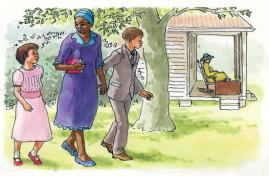
TKAM starting to get interesting
So this week for GHEnglish we were tasked with reading To Kill A Mockingbird from chapters 10 to 14, and a lot went down in just five chapters! A dog was shot, Jem and Scout were the target of Mrs. Dubose’s torment and then they had to read to her as she was fighting a morphine addiction after Jem took his anger out on her flower bushes, Calpurnia took Jem and Scout to her church, Aunt Alexandra came to stay with the Finches in Maycomb, and Dill ran away and turned up at the Finch’s house in Maycomb. I have really enjoyed reading this book and so far, I feel like a lot has happened in the past 5 chapters which has made the book very interesting to read and has provoked lots of thinking throughout the book.
 As I mentioned in the last blog post, the two characters that I’ve been tasked with following throughout the book are Boo Radley and Calpurnia. Since Boo Radley wasn’t really featured in chapters 10-14, I’m only going to focus on Calpurnia in this section. I honestly feel like Calpurnia is somewhat of a flat character in the book. She’s not going through (at least she hasn’t thus far) any major character development and her main purpose in the book so far is just to take care of the kids and help Scout and Jem grow as people. I do think that Calpurnia is definitely an important character in the book and I think that Scout and Jem would be much different had they not had Calpurnia there to help guide them and act as a mother-figure for them, especially for Scout, but I feel like she’s going to be a very steady character in the book and she’s not really going to change. That’s okay though because the book isn’t focused on her changes, it’s focused on the changes and developments of characters like Scout and Jem, and even Boo Radley. The changes that these characters undergo is catalyzed by Calpurnia’s experience and wisdom, like with this quote:
As I mentioned in the last blog post, the two characters that I’ve been tasked with following throughout the book are Boo Radley and Calpurnia. Since Boo Radley wasn’t really featured in chapters 10-14, I’m only going to focus on Calpurnia in this section. I honestly feel like Calpurnia is somewhat of a flat character in the book. She’s not going through (at least she hasn’t thus far) any major character development and her main purpose in the book so far is just to take care of the kids and help Scout and Jem grow as people. I do think that Calpurnia is definitely an important character in the book and I think that Scout and Jem would be much different had they not had Calpurnia there to help guide them and act as a mother-figure for them, especially for Scout, but I feel like she’s going to be a very steady character in the book and she’s not really going to change. That’s okay though because the book isn’t focused on her changes, it’s focused on the changes and developments of characters like Scout and Jem, and even Boo Radley. The changes that these characters undergo is catalyzed by Calpurnia’s experience and wisdom, like with this quote:
 “It’s not necessary to tell all you know. It’s not ladylike -in the second place, folks don’t like to have somebody around known’ more than they do. It aggravates ’em. You’re not gonna change any of them by talking’ right, they’ve got to want to learn themselves and when they don’t want to learn there’s nothing you can do but keep your mouth shut or talk their language.” (page 126)
“It’s not necessary to tell all you know. It’s not ladylike -in the second place, folks don’t like to have somebody around known’ more than they do. It aggravates ’em. You’re not gonna change any of them by talking’ right, they’ve got to want to learn themselves and when they don’t want to learn there’s nothing you can do but keep your mouth shut or talk their language.” (page 126)
With this quote, Calpurnia is giving the kids some very significant advice to help them be more careful of people’s feelings and to give them a piece of wisdom that they will be able to use the rest of their lives. I also feel like it was crucial for Calpurnia to give the children this bit of advice at this point in the book with the trial coming up so soon, since she wants to let the kids know that people will be angry with Atticus and the rest of the family for defending a black man and going against the typical nature and narrative of the town, and that they shouldn’t pay it any mind since people will always feel threatened by those who know more than they do.

Scout’s realization
I also feel like Calpurnia has helped the children to grow just by taking them to church and opening them up to another part of her life. Taking the kids to church gave them more insight into Calpurnia’s life, and allowed them to learn more about her and grow in the process of learning these things. After church, Scout reflected, “That Calpurnia led a modest double life never dawned on me. The idea that she had a separate existence outside our household was a novel one, to say nothing of her having command of two languages.” (page 125) This short quote serves to show that Calpurnia helps lead Scout and Jem and induces change in them, making them better, more thoughtful people.
 As always, we had a discussion in class on Thursday on the five chapters that we had read, and honestly the discussion wasn’t the best. Our class still hasn’t found our groove and our discussions aren’t very smooth, and only a few people talked during the discussion despite the attempts of our teacher to give us talking points. Since no one really talked and the discussion was a multitude of awkward silences, I could only grab one or two things from the discussion to talk about in this blog post.
As always, we had a discussion in class on Thursday on the five chapters that we had read, and honestly the discussion wasn’t the best. Our class still hasn’t found our groove and our discussions aren’t very smooth, and only a few people talked during the discussion despite the attempts of our teacher to give us talking points. Since no one really talked and the discussion was a multitude of awkward silences, I could only grab one or two things from the discussion to talk about in this blog post.
Despite the lack of participation, one thing that I did like from the discussion and I was able to take away was one kid’s view on who the “mockingbird” of To Kill A Mockingbird really is. This person suggested that the mockingbird of the story suggests the African American community, not only the one in the town of Maycomb but all African Americans who were being oppressed during the time period of the book. I found this to be a very interesting take on the idea of the mockingbird in the story, and it’s definitely a view that I didn’t have before the discussion. I primarily thought of Boo as the mockingbird of the story thus far, since he has been punished for so long by his family when he didn’t really do anything wrong, but the suggestion that African Americans are mockingbirds as well definitely makes sense considering the time period. The person who gave this idea continued to say how Atticus is defending the mockingbird (African Americans) and not shooting them down (oppressing them) like everyone else in society, which I think is a very good insight considering the fact that Atticus was the one to say that it’s a sin to kill a mockingbird in the first place.
Although that was a very good insight to come out of the discussion, that was about it for this week! Next week, I hope that our discussion will be able to go a bit more smoothly, and so I’m formulating some questions now which I hope will help promote some meaningful discussion:
- Why do we compromise our knowledge for the sake of others?
- This quote is directly related to the first quote from Calpurnia earlier in the blog post that I never got a chance to ask this past week, and I feel like we could start a good discussion off of this question
- Can everyone be considered a mockingbird? Are there factors which make one person more of a mockingbird over others?
- This is just a question that I’ve been asking myself throughout the book, and I’d like to see what other people have to say about it. I think that it would be interesting to see how different people might define a mockingbird and what place people may see mockingbirds having in our society.
